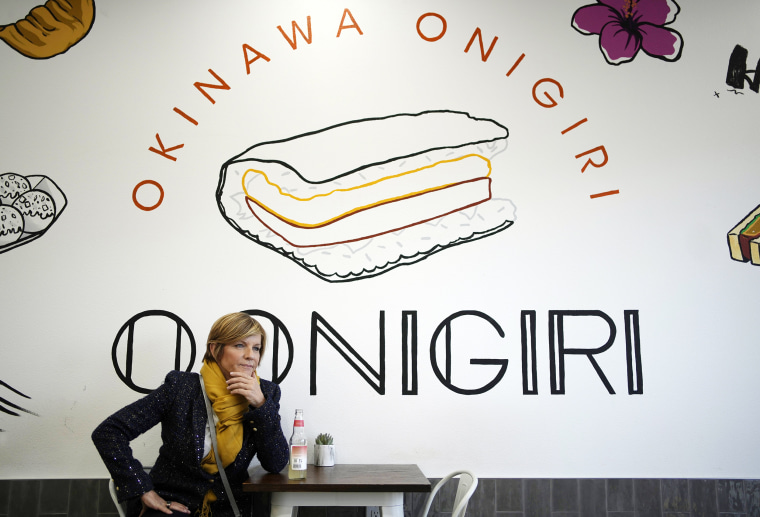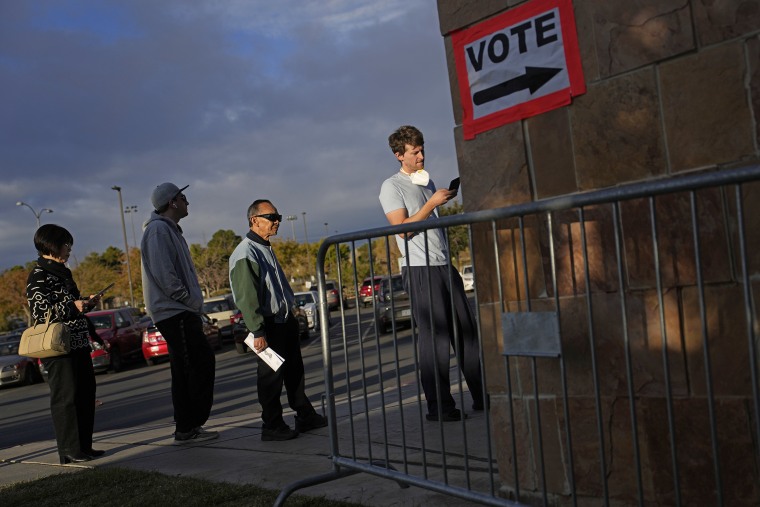In the highly competitive swing state of Nevada, both parties aggressively courted Asian Americans and Pacific Islanders ahead of last week's midterm elections, but Democrats managed to clinch the group's vote.
The state is one of five in which Asian Americans make up 10% of the overall electorate. And they’re becoming an increasingly influential voting bloc, preferring Democratic candidates at more than 60%, according to one exit poll.
But still, in some parts of the state, the margin was much tighter. And some warn that, with changing demographics and drastic generational differences, the parties will have to adapt to earn the electorate’s long-term loyalty.
“There are first-generation Nevadans and second-generation Nevadans and people who have been born and raised here, who are going to end up becoming voters in the state in the next 10 to 20 years,” said Amy Koo, assistant director of outreach at Las Vegas-based nonprofit Asian Community Development Council.
“What are the things that they’re going to be looking for … It’s going to be which party and which campaigns are going to invest in Asian American organizing.”
Nevada is home to the third largest AAPI electorate in the country, growing by 167% in the last two decades. The lion’s share of voters are Filipino Americans, who in national polls have historically leaned left but are relatively conservative when compared to other Asian American ethnicities.

In House, Senate and gubernatorial races, the electorate favored Democratic candidates, preliminary exit poll results from the Asian American Legal and Defense Fund (AALDEF) show. Polling, however, is done in primarily urban areas and may capture fewer conservative, suburban and rural voters, Jerry Vattamala, the director of the democracy program at AALDEF, said.
But even in tight races, the group’s influence, experts say, isn’t to be discounted. In the 3rd Congressional District, where Democrat Rep. Susie Lee won by just over 1,700 votes, Asian Americans provided the margin of victory, supporting her at 47%, according to an election eve poll conducted by the AAPI Civic Engagement Fund. Another 43% supported GOP candidate April Becker.
Experts point to factors like policy priorities, labor concerns and the moderate nature of the candidates in the area for the electorate leaning left. Koo said both parties made significant efforts to appeal to Asian Americans, particularly in comparison to elections past.
There’s been no shortage, for example, of traditional Filipino dinners, where candidates took part in communal, buffet style meals. Other times, candidates would show up to community events, or FaceTime community members to connect. Koo also noted that there’s been in-language mailers and other more culturally relevant communications from candidates.
“Most people know now that if you want to have the Asian American community turnout, you need to reach out to them through that kind of microcosm of Chinese American outings, making sure that you reach out to the Vietnamese American community,” Koo said. “There are gathering spaces for Asian Americans, but so often, it’s really broken down by ethnicity.”
But Vattamala said that Democrats were likely able to break through, in part because of the local community’s policy priorities. According to his group’s exit poll, health care emerged as the top issue for voters and is one that tends to pull people left, he said.
When looking at Filipino voters specifically, a national survey this year showed that the group prioritizes the issue more so than all other Asian groups, with 89% reporting that health care was of “extremely high” or “very high” importance to them. Moreover, Asian Americans make up a significant portion of Nevada’s medical community, at 19%. And issues like the Affordable Care Act continue to be in discussion, Vattamala said.
Another critical factor could be the significant labor movement in Nevada. Janelle Wong, senior researcher at the nonprofit AAPI Data, explained that cities like Las Vegas, where the largest share of Asian Americans live, have industries that draw service workers, casino workers and other lower income jobs.
And many of these industries are unionized, she pointed out, and that’s in part due to Asian American labor organizers like Luisa Blue, a Filipino American activist who organized health care workers in Las Vegas and was elected international executive vice president at the Service Employees International Union in 2016.
“The main industry there is service and hospitality, and there’s a lot of Asian Americans that are employed by that industry,” Wong said. “The union movement is still very active there and there historically have been very prominent Asian American union leadership there.”
Vattamala similarly said that while many Nevada survey respondents said economy and jobs were also a top issue for them in this election, it’s likely that voters are thinking of that issue in terms of minimum wage and union support.
Experts also noted that previous surveys show that the general Asian Americans population identifies slightly left of center. Though the electorate showed a similar preference for Democratic candidates in the last midterm election, experts say the loyalty may have more to do with the nature of the candidates themselves. Democratic candidates in Nevada, who are often more moderate than those on the coasts, may naturally align more with the Asian American community. Lee, for example, is considered a moderate House Democrat.
“I don’t think there would be as much support for somebody that was more left,” Vattamala said.
Times are changing, however. Koo said that the younger generations, particularly those born in the U.S., may be seeking candidates with different legislative priorities. In conversations with the youth, Koo said she’s observed a sharp pivot from what many voters in the older generation, who are primarily focused on issues like health care and immigration, want to hear from candidates.
“We’re starting to see with younger Asian American voters, climate is a huge conversation that everyone is having. Gun safety is a big conversation that people are starting to have,” Koo said.
And as Asian Americans become increasingly involved in politics, Koo said that the threat of misinformation will likely grow along with it. It’s something, she said, that many organizers have had to combat during the election cycle. It shouldn’t just be on organizations, but also on parties and candidates themselves to be doing a more thorough job of dismantling these narratives in languages that voters feel most comfortable so that their positions aren’t manipulated, she said.
“We saw people misrepresenting positions, misrepresenting ballot questions in language,” Koo said. “In-language education is going to be a huge part of making sure that in the future, we are providing accurate information to our communities.”
